Apr
08
2019
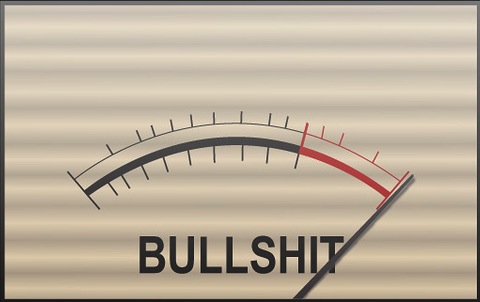 Often times when I state that I do not accept a claim at face value, I am challenged with the question – “Well, do you think they are lying?” The question results from a false dichotomy – that someone is either telling the truth or consciously lying. It misses a phenomenon that is perhaps vastly more large than conscious lying – bullshit.
Often times when I state that I do not accept a claim at face value, I am challenged with the question – “Well, do you think they are lying?” The question results from a false dichotomy – that someone is either telling the truth or consciously lying. It misses a phenomenon that is perhaps vastly more large than conscious lying – bullshit.
Lying is when you say something that you know to be false. Bullshitting is when you say something that you don’t know is true or not. There is a spectrum here also, where people may be exaggerating or stretching what they know to be true, mixing in speculation and opinion with facts, distorting what is known with a conscious or unconscious agenda (motivated reasoning), or they are simply gullible themselves. How carefully do you vet a specific piece of information before you accept it and repeat it as true, and how transparent are you about your sources and your confidence in the information?
Most people, I would argue, are not careful enough. Being skeptical is essentially about being really careful and transparent about the information you accept.
Psychological researchers are trying to understand the phenomenon of bullshit, and actually use that term in the literature. A recent study extends this a bit, and is in line with previous research. Pennycook and Rand looked at 1,606 participants through online surveys. They evaluated how receptive they are to statements which are referred to as “pseudoprofound bullshit” and also their ability to discriminate real news from fake new.
Pseudoprofound bullshit are statements that are designed to superficially sound deep, but are actually utterly meaningless (think of pretty much anything Deepak Chopra says). For example, “Hidden meaning transforms unparalleled abstract beauty.”
There is even a website that generates random “Chopraesque” statements. For example, it just generated for me, “Innocence gives rise to subjective chaos.” This literally just uses an algorithm to string together random words but structured in such a way as to produce such statements.
Continue Reading »
Aug
20
2018
 I am not talking about dubious research, but rather research into the phenomenon of bullshit (BS) itself. BS has an operational definition or paradigm within psychological research – it is the extent to which subject rate as highly meaningful statements which are crafted to be vacuous, unconcerned about the truth, and lacking in any unambiguous meaning. Think just about anything Deepak Chopra says. Such statements are also called “pseudoprofound” when they are BS and try to sound profound or philosophical.
I am not talking about dubious research, but rather research into the phenomenon of bullshit (BS) itself. BS has an operational definition or paradigm within psychological research – it is the extent to which subject rate as highly meaningful statements which are crafted to be vacuous, unconcerned about the truth, and lacking in any unambiguous meaning. Think just about anything Deepak Chopra says. Such statements are also called “pseudoprofound” when they are BS and try to sound profound or philosophical.
“Intuition expresses visible choices.”
“Meditation makes the entire nervous system go into a field of coherence.”
“Experiential truth belongs to the expansion of abstract beauty.”
One of those quotes is from Chopra, the other two from the Chopra simulator.
A recent study extends the research on BS a bit, but first gives a brief summary of what existing research has found:
Recently, some psychological research has focused on individual differences in the extent to which people perceive bullshit as meaningful. These studies have shown that people who rate bullshit sentences as highly meaningful have more religious and supernatural beliefs, are less reflective, intelligent, and numerate, more prone to ontological confusions and conspiratorial ideation, endorse free market policies more, and have more favorable views of Republican presidential candidates in US politics. The aim of this study is to develop the academic field of bullshit further.
Given the relatively few number of references in the paper, it’s probably best to consider these conclusions preliminary. While many of these features make sense, like being prone to believing in the paranormal and conspiracies, I would want to see some independent replication before making any firm conclusion.
Continue Reading »
Jul
05
2018
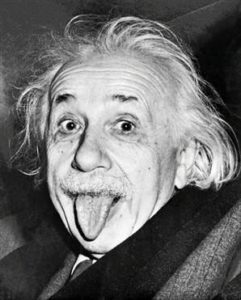 Etzel Cardeña has published an extensive review of parapsychology concluding that it is both plausible and supported by evidence. It stands, in my opinion, as an excellent example of everything that is wrong with psi research. There is a lot of meat to go through, but I want to focus in this article on his use of quantum mechanics to justify the plausibility of ESP and psi phenomena.
Etzel Cardeña has published an extensive review of parapsychology concluding that it is both plausible and supported by evidence. It stands, in my opinion, as an excellent example of everything that is wrong with psi research. There is a lot of meat to go through, but I want to focus in this article on his use of quantum mechanics to justify the plausibility of ESP and psi phenomena.
Psi, or anomalous cognition, is a group of alleged phenomena that include sensing what other people are thinking, viewing remote locations not accessible to the normal senses, and predicting the future in some way. These claims are inherently implausible because there is no way to account for them with known phenomena. They appear, therefore, to violate well-established laws of physics. Therefore, any reasonable scientists would argue, the threshold of evidence needed before concluding that a psi phenomenon is real should be very high. What we have is very low-grade evidence at best, therefore it is reasonable to reject claims for psi.
Psi proponents, therefore, attack the two pillars of this rejection – that psi is implausible, and that the evidence is low-grade. Cardeña is no exception, and that is precisely what he is trying to do in his paper. He fails on both counts, producing only a string of cherry-picked evidence, selected quotes that can be made to seem as if they support his position, and very strained logic.
What do we mean by plausibility? This is actually a deceptively complex question. Plausibility essentially means, if we had to guess, based on everything we know so far about the universe, is a specific claim likely to be true? There is a very broad range of plausibility, and unfortunately often people refer to plausibility as a false dichotomy, that a claim is either plausible or not. This dichotomy obscures a vast spectrum, which matters because we deal with different locations on that spectrum very differently.
Continue Reading »
Jan
15
2018
 I know that Oprah has not stated she is considering running for president in 2020 and the initial buzz about her is just a fantasy. But some of her people have stated that she would consider running, and it is possible that they are testing the waters. Let’s put the idea out there and see how the public responds.
I know that Oprah has not stated she is considering running for president in 2020 and the initial buzz about her is just a fantasy. But some of her people have stated that she would consider running, and it is possible that they are testing the waters. Let’s put the idea out there and see how the public responds.
Those who are enthusiastic about Oprah after her rousing speech at the Golden Globes have failed to fully appreciate what the real problem with Trump is (at least from this skeptic’s perspective). This is not about politics, and all the ways that Oprah is different than Trump don’t affect the ways in which she is the same – and those similarities are what I am primarily concerned about.
Marc Fisher, writing for The Citizen, describes what Trump apparently means when he calls himself a genius. Trump thinks that being smart is succeeding without trying. He congratulated himself on getting through school without ever really studying (like those other chumps). He admires instinct, his ability to feel in his gut what the answer is. He criticizes academics, and brags that the most important thing he learned at school was that academics don’t really know anything.
By all accounts that it his approach to the presidency. The very fact that he thought he could be president without any prior relevant experience betrays this attitude. It did not appear to bother him, or even occur to him, that being the executive of a large and complex government might requires skills and experience that he had never honed, or even tested. He thought he could sit in the Oval Office and just shoot from the hip, rely on his gut to divine the right answer to the country’s and the world’s complex problems. He would have a staff of eggheads to worry about the details.
Continue Reading »
Dec
04
2015
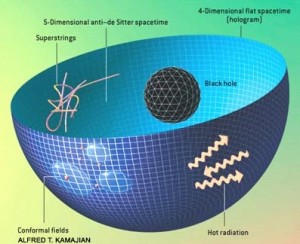 The job of theoretical physicists is describing the universe – a complex, subtle, and extremely weird place from a human perspective. It seems weird because we occupy a certain range of size and distance, which has adapted our intuition to a very narrow range of reality.
The job of theoretical physicists is describing the universe – a complex, subtle, and extremely weird place from a human perspective. It seems weird because we occupy a certain range of size and distance, which has adapted our intuition to a very narrow range of reality.
It is amazing that we have been able to use our collective intellect to probe the universe at scales of size, distance, and time that are vastly outside our experience. Two tools of intellectual rigor have made this possible – math and science.
Theoretical physicists sometimes rely more on the former than the latter. This means they spend their time constructing mathematical descriptions of the universe based upon what is already known. They are thinking about what might be, and then seeing if they can make the math work out.
Such a process is part of science, but it does not close the loop on science until the mathematical models are tested against reality in some way. This may pose theoretical or practical hurdles.
Continue Reading »
Dec
03
2015
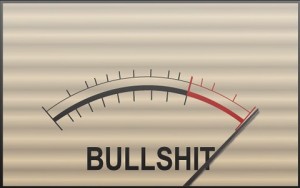 A new study is getting a lot of attention, partly because of its provocative title: On the reception and detection of pseudo-profound bullshit. It also seems that people generally like to hear stories about how dumb other people are. That is why I often emphasize that such studies are not about “other” people, they are about people.
A new study is getting a lot of attention, partly because of its provocative title: On the reception and detection of pseudo-profound bullshit. It also seems that people generally like to hear stories about how dumb other people are. That is why I often emphasize that such studies are not about “other” people, they are about people.
In this case, however, the researchers do find that there are subsets of subjects who react differently to what they call “pseudo-profound bullshit.” They write:
Here we focus on pseudo-profound bullshit, which consists of seemingly impressive assertions that are presented as true and meaningful but are actually vacuous. We presented participants with bullshit statements consisting of buzzwords randomly organized into statements with syntactic structure but no discernible meaning (e.g., “Wholeness quiets infinite phenomena”).
Continue Reading »
Apr
03
2015
CNN published an opinion piece yesterday: Deepak Chopra: The problem with atheism. I could not help but to read it, just as you have to slow down to look at the results of a serious car crash. Go ahead, Dr. Chopra, inform me about my own belief system, which you have demonstrated over the years you clearly do not understand.
He starts off reasonable enough. In fact, if I didn’t know the article was written by Chopra it could be confused for a reasonable position:
We all fall somewhere on the sliding scale of belief and unbelief. Secular society has sharpened our demand for truth. To me, this is a positive development. If belief in God can’t stand up to proof, it won’t sustain a person through difficult times.
It’s always good to recognize a false dichotomy. Endorsing a demand for truth – also good. I take issue with his conclusion, however. I think supernatural beliefs can serve their emotional purpose whether or not they stand up to skeptical scrutiny. “Proof” is, by definition, irrelevant to faith, which is belief without proof.
The statement gets to the core of what I think is (at least one of) the problem with Chopra. He wants to be able to prove, or at least logically demonstrate, that his particular faith is truth. This is a common state, but ultimately it is folly. Either you follow logic, reason, and evidence to whatever conclusion it reaches, or you don’t. Faith begins with the conclusion. This is not a false dichotomy but a genuine stark difference in approach.
Continue Reading »
Oct
28
2014
Surveys are always problematic because they are subject to interpretation, the precise phrasing of questions, sampling bias, and perhaps hidden assumptions on the part of those taking the survey. The results of any single survey, therefore, should be taken with a grain of salt. Still, they can provide a useful snapshot (if done well) of the current culture.
Skeptics are always interested in what the general public “believes.” The term “belief” is itself problematic, and when used in a survey it is subject to interpretation by those taking the survey. I am not one of those who object to ever using the term “belief.” It is a reasonable short hand for, “I find the totality of available evidence to be compelling,” or “I accept the scientific consensus on this issue,” at least in informal writing or conversation.
In a survey, however, I would prefer any questions about what people “believe” to be replaced by, or at least supplemented by, statements about what the scientific evidence says.
In any case, we have another recent survey about what Americans believe, from Chapman University. The survey covers a lot of territory, from religious affiliation and practice, to what people fear, to what they believe about scientific and paranormal topics. You can download the entire 73-page report of the results from the link above.
Continue Reading »
Jun
17
2014
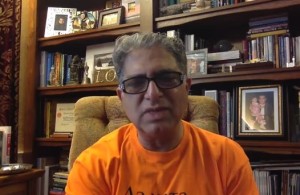 Deepak Chopra doesn’t appear to like skeptics much, or understand them. He just put out a YouTube video challenging “Randi and his cronies” to his own fake version of the million dollar challenge.
Deepak Chopra doesn’t appear to like skeptics much, or understand them. He just put out a YouTube video challenging “Randi and his cronies” to his own fake version of the million dollar challenge.
All we have to do, apparently, is make 50-100 years of scientific advance in neuroscience in a single peer-reviewed paper. I’ll get started on that right away.
Actually, even that probably would not be sufficient. The whole point of pseudoscientific goal-post moving is to keep forever out of reach of current scientific evidence. It doesn’t matter how much progress science makes, there will always be gaps and limitations to our knowledge. Chopra lives in the gaps.
Here is his exact challenge:
Dear Randi: Before you go around debunking the so-called “paranormal,” please explain the so-called “normal.” How does the electricity going into the brain become the experience of a three dimensional world in space and time. If you can explain that, then you get a million dollars from me. Explain and solve the hard problem of consciousness in a peer-reviewed journal, offer a theory that is falsifiable, and you get the prize.
The challenge is absurd because it is completely undefined. “Explain” to what degree? Science often advances by developing theories that are progressively deeper. Obviously we can explain consciousness on some level, and just as obviously Chopra would not accept that level as sufficient, but he gives absolutely no indication of how much deeper an explanation he would require.
Continue Reading »
Apr
15
2014
Skeptics tend (as they should) to question everything, even the need for a movement of self-identified skeptics. It is an interesting question – what is the net cultural effect of organized scientific skepticism?
Of course, we can’t really ever know the answer to this question. There are too many moving parts. We could point to cultural trends, but this is probably the worst line of evidence. There is no way to control for skepticism as an isolated variable. We have no way of knowing what the world would be like without organized skepticism.
We can point to individuals whose lives have been changed, they believe for the better. I am heartened by every e-mail I receive from a reader or listener who says their life has been changed for the better because of skeptical outreach. Perhaps they were steered away from a career in pseudoscience, learned how to think more critically about everything, or just found a community to which they could connect.
Continue Reading »
 Often times when I state that I do not accept a claim at face value, I am challenged with the question – “Well, do you think they are lying?” The question results from a false dichotomy – that someone is either telling the truth or consciously lying. It misses a phenomenon that is perhaps vastly more large than conscious lying – bullshit.
Often times when I state that I do not accept a claim at face value, I am challenged with the question – “Well, do you think they are lying?” The question results from a false dichotomy – that someone is either telling the truth or consciously lying. It misses a phenomenon that is perhaps vastly more large than conscious lying – bullshit.
 I am not talking about dubious research, but rather research into the phenomenon of bullshit (BS) itself. BS has an operational definition or paradigm within psychological research – it is the extent to which subject rate as highly meaningful statements which are crafted to be vacuous, unconcerned about the truth, and lacking in any unambiguous meaning. Think just about anything Deepak Chopra says. Such statements are also called “pseudoprofound” when they are BS and try to sound profound or philosophical.
I am not talking about dubious research, but rather research into the phenomenon of bullshit (BS) itself. BS has an operational definition or paradigm within psychological research – it is the extent to which subject rate as highly meaningful statements which are crafted to be vacuous, unconcerned about the truth, and lacking in any unambiguous meaning. Think just about anything Deepak Chopra says. Such statements are also called “pseudoprofound” when they are BS and try to sound profound or philosophical. Etzel Cardeña has published an
Etzel Cardeña has published an  I know that Oprah has not stated she is considering running for president in 2020 and the initial buzz about her is just a fantasy. But some of her people have stated that she would consider running, and it is possible that they are testing the waters. Let’s put the idea out there and see how the public responds.
I know that Oprah has not stated she is considering running for president in 2020 and the initial buzz about her is just a fantasy. But some of her people have stated that she would consider running, and it is possible that they are testing the waters. Let’s put the idea out there and see how the public responds.







